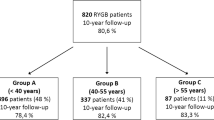Abstract
Introduction
One of the current criteria for bariatric surgery is to be of an age between 18 and 65 years. In all the available literature, there is a lack of studies focusing on the results of bariatric surgery in younger patient. This could be of great interest because the weight loss response can be altered by differences in metabolism or compliance rate. In recent years, a high amount of patients between 18 and 25 years of age have undergone bariatric surgery in our center, and it is our aim to evaluate the weight loss results in this youngest patient group.
Methods
All preoperative and perioperative data from patients aged 18–25 and 35–55 years (control group) were collected retrospectively. Bariatric procedures took place between 2011 and 2014. Follow-up data were gathered prospectively by collecting (laboratory) measurements and questionnaires.
Results
In total, 103 young adults (mean age 22.5) were matched to 103 adult control patients (mean age 42.6) on BMI and date of surgery. Of the young adults’ group, 75 patients underwent a Roux-en-Y gastric bypass (RYGB) compared with 80 patients in the control group. Three years after RYGB, mean %total body weight loss (%TBWL) was 34 (± 9) and 30.3 (± 9) (p = 0.03), respectively.
Conclusion
Bariatric surgery is effective in young adults, and results after RYGB are even better compared with age groups in which bariatric surgery is most often performed. The high remission rate of comorbidities shows the importance of effective treatment options at a young age and preventing damaging effects in the long term.


Similar content being viewed by others
References
Baker JL, Olsen LW, Sorensen TIA. Childhood body-mass index and the risk of coronary heart disease in adulthood. N Engl J Med. 2007;357(23):2329–37.
Dam van RM, Willnett WC, Manson JE, et al. The relationship between overweight in adolescence and premature death in women. Ann Intern Med. 2006;145:91–7.
Crocker MK, Yavoniski JA. Pediatric obesity: etiology and treatment. Pediatr Clin N Am. 2011;58:1217–40.
Pavkov ME, Bennet PH, Knowler WC, et al. Effect of youth-onset type 2 diabetes mellitus on incidence of end-stage renal disease and mortality in young and middle-aged Pima Indians. JAMA. 2006;296(4):421–6.
Freedman DS, Zuguo M, Srinivasan SR, et al. Cardiovascular risk factors and excess adiposity among overweight children and adolescents: the Bogalusa Heart Study. J Pediatr. 2007;150:12–7.
Cazzo E, Gestic MA, Utrini MP, et al. Bariatric surgery in the elderly: a narrative review. Rev Assoc Med Bras. 2017;63(9):787–92.
Roux le CW, Heneghan HM. Bariatric surgery for obesity. Med Clin N Am. 2018;102:165–82.
Sjostrom L. Review of the key results from the Swedish Obese Subjects (SOS) trial – a prospective controlled intervention study of bariatric surgery. J Intern Med. 2013;273:219–34.
Cooper TC, Simmons EB, Webb K, et al. Trends in weight regain following Roux-en-Y gastric bypass (RYGB) bariatric surgery. Obes Surg. 2015;25:1474–81. https://doi.org/10.1007/s11695-014-1560-z.
Kaska L, Sledzinski T, Chomiczewska A, et al. Improved glucose metabolism following bariatric surgery is associated with increased circulating bile acid concentrations and remodeling of the gut microbiome. World J Gastroenterol. 2016;22(39):8698–719.
Felsenreich DM, Ladinig LM, Beckerhinn P, et al. Update: 10 years of sleeve gastrectomy – the first 103 patients. Obes Surg. 2018;28:3586–94. https://doi.org/10.1007/s11695-018-3399-1.
Thereaux J, Lesuffleur T, Czernichow S, et al. Association between bariatric surgery and rates of continuation, discontinuation or initiation of antidiabetic treatment 6 years later. JAMA. 2018; https://doi.org/10.1001/jamasurg.2017.6163.
Shah K, Nergard BJ, Frazier KS, et al. Long-term effects of laparoscopic Roux-en-Y gastric bypass on metabolic syndrome in patients with morbid obesity. Surg Obes Relat Dis. 2016;12(8):1449–56.
Ikramuddin S, Korner J, Lee W-J, et al. Lifestyle intervention and medical management with vs without Roux-en-Y gastric bypass and control of hemoglobin A1c, LDL cholesterol, and systolic blood pressure at 5 years in the Diabetes Surgery Study. JAMA. 2018;319(3):266–78.
Benaiges D, Sague M, Flores-Le Roux JA, et al. Predictors of hypertension remission and recurrence after bariatric surgery. Am J Hypertens. 2015;29(5):653–9.
Kolotkin RL, Andersen JR. A systematic review of reviews: exploring the relationship between obesity, weight loss and health-related quality of life. Clin Obes. 2017;7:273–89.
Livhits M, Mercado C, Yermilov I, et al. Behavioral factors associated with successful weight loss after gastric bypass. Am Surg. 2010;76(10):1139–42.
Jong de MMC, Hinnen C. Bariatric surgery in young adults: a multicenter study into weight loss, dietary adherence and quality of life. SOARD. 2017;13:1204–11.
Bailly L, Schiavo L, Sebastianelli L, et al. Anemia and bariatric surgery: results of a national French survey of administrative data of 306,298 consecutive patients between 2008 and 2016, Obes Surg. 2018; https://doi.org/10.1007/s11695-018-3143.x.
Lupoli R, Lembo E, Saldalamcchia G, et al. Bariatric surgery and long-term nutritional issues. World J Diabetes. 2017;8(11):464–74.
McVay MA, Friedman KE, Applegate KL, et al. Patients predictors of follow-up care attendance in Roux-en-Y gastric bypass patients. SOARD. 2013;9:956–62.
Author information
Authors and Affiliations
Corresponding author
Ethics declarations
This study was approved by the national ethical committee and the local institutional review board. Written informed consent was obtained from all participants.
Conflict of Interest
The authors declare that they have no conflict of interest.
Additional information
Publisher’s Note
Springer Nature remains neutral with regard to jurisdictional claims in published maps and institutional affiliations.
Electronic Supplementary Material
ESM 1
(DOCX 19 kb).
Rights and permissions
About this article
Cite this article
Cooiman, M.I., Aarts, E.O., Janssen, I.M.C. et al. Weight Loss, Remission of Comorbidities, and Quality of Life After Bariatric Surgery in Young Adult Patients. OBES SURG 29, 1851–1857 (2019). https://doi.org/10.1007/s11695-019-03781-z
Published:
Issue Date:
DOI: https://doi.org/10.1007/s11695-019-03781-z




